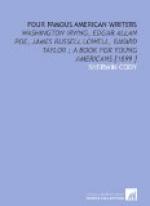A little farther along the music seems to broaden and deepen:
Now is the high-tide of the year,
And whatever of life hath
ebbed away
Comes flooding back with a ripply cheer,
Into every bare inlet and
creek and bay;
Now the heart is so full that a drop overfills
it,
We are happy now because God
wills it.
You must read the rest of the poem for yourself, ever remembering that to read poetry so that you understand it and love it means that you yourself are a poet at heart; and if you come to love a great poem you may be proud of your achievement.
CHAPTER XI
PROFESSOR, EDITOR, AND DIPLOMAT
There was a touching and very warm affection between Longfellow and Lowell. Mrs. Lowell says of it, “I have never seen such a beautiful friendship between men of such distinct personalities, though closely linked together by mutual tastes and affections. They criticise and praise each other’s performances with frankness not to be surpassed, and seem to have attained that happy height of faith where no misunderstanding, no jealousy, no reserve exists.” Often in his diary Longfellow speaks of “walking to see Lowell,” who was either “musing before his fire in his study,” or occupied in his “celestial study, with its pleasant prospect through the small square windows.”
Longfellow was some dozen years the elder; and when the time came that he wished to retire from the professorship of belles-lettres in Harvard College, he was very desirous that Lowell should take the place. There were others who wanted it; but it was arranged that Lowell should become Longfellow’s successor. Lowell had never before been a professor and he did not particularly like the work. In 1867 he speaks of “beginning my annual dissatisfaction of lecturing next week.” Still, he was popular with the students and highly successful because of his fine gift of literary criticism. Here, for instance, is his definition of poetry: “Poetry, as I understand it, is the recognition of something new and true in thought or feeling, the recollection of some profound experience, the conception of some heroic action, the creation of something beautiful and pathetic.”
In his diary Longfellow sometimes refers to Mrs. Lowell, “slender and pale as a lily”; and once when he and Charles Sumner had gone to see Lowell and found that he was not at home, Longfellow adds, “but we saw his gentle wife, who, I fear, is not long for this world.”
His words were prophetic. She gradually failed in strength. Of their four children, three died while mere babes. In 1853 Mrs. Lowell herself died.
The appointment to Longfellow’s professorship did not come until a little over a year after the death of Mrs. Lowell. During her life Mr. Lowell’s income was very small and irregular, a few hundred dollars a year in payment of royalties on his books and for articles and poems contributed to various periodicals. With his appointment to the Harvard professorship he became financially independent for the first time. To prepare for it he went abroad, spending most of his time at Dresden.




